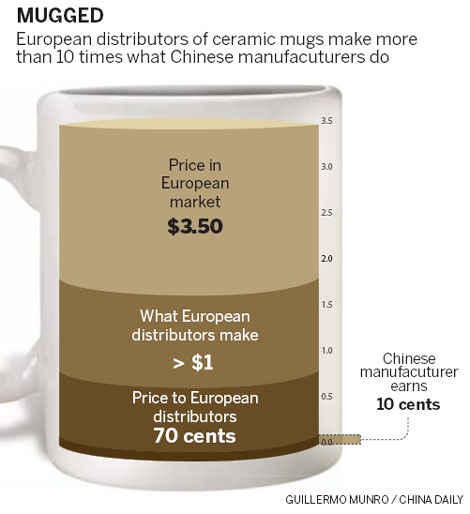Dumping case likely to harm ceramic makers
Updated: 2012-02-17 07:42
By Zheng Yangpeng (China Daily)
|
||||||||

BEIJING - The European Union's latest anti-dumping investigation into Chinese ceramic tableware and kitchenware may put at risk manufacturers who are already struggling to make meager profits, according to a ceramics industry association.
The anti-dumping inquiry follows similar inquiries that were made into Chinese building ceramics in 2011 and Chinese ceramic tiles in 2010. As a result of the latter investigation, the European Union adopted a punitive tax rate of up to 69.7 percent on imported Chinese ceramic tiles.
The China Ceramics Industrial Association said the case against Chinese ceramic tableware and kitchenware was formally filed on Thursday.
The latest investigation is the largest of its sort to emerge since Indonesia began a similar inquiry into ceramic tableware, according to Lan Weibing, director of the Foshan bureau of the association.
More than 2,000 Chinese ceramics makers might be affected by the latest investigation, he said.
China exported more than $700 million worth of ceramic tableware and kitchenware to the EU last year, according to the association. China makes more household ceramics than any other country and has a nearly 50 percent share of the European market for such products.
The possible consequences of the latest trade dispute can be estimated by looking at those from a previous one. Foshan, a Chinese ceramic tiles powerhouse, saw its exports of the products drop by 24.4 percent in the first 10 months of 2011 after the punitive tax was imposed following the anti-dumping investigation.
About 11 percent of China's household ceramics were exported to the EU.
And the likely consequences don't only concern money. They may also include job losses, since the production of household ceramics requires many workers.
The factories that make household ceramics in China are mainly in Hunan and Jiangxi provinces and the Guangxi Zhuang autonomous region.
The industry has been frequently hit by dumping accusations in recent years. Last year alone, South Korea, Argentina, Brazil and Peru began anti-dumping investigations into Chinese ceramic products.
Experts have said the industry has a poor business model. Most Chinese ceramic manufacturers are original equipment manufacturers and lack brands of their own. That situation results in most of the profits from their products going to foreign brand holders and distributors.
Yang Xuanli, sales manager of Shunxiang Porcelain, a large household-ceramics manufacturer, said her company receives little of the profits that come from sales of its products.
For example, mugs priced at $3.50 in the European market are usually sold to European distributors for 70 cents in China. From those sales, the Chinese manufacturer only gets 10 cents, while the European distributors earn more than $1.
Faced with the growing number of investigations, various Chinese ceramic manufacturers said they will contest the charges by filing appeals to trade authorities.
Guo Cheng, of the China Ceramics Industrial Association, said it will help manufacturers in the disputes.
"We have a good chance of winning," Guo said. "We hope the businesses that do appeal can agree on a good duty rate."
The European Commission has nine months to decide whether to impose provisional anti-dumping duties for half a year, and EU governments have 15 months to decide whether to apply "definitive" levies for five years.
China Daily
(China Daily 02/17/2012 page13)

 Relief reaches isolated village
Relief reaches isolated village
 Rainfall poses new threats to quake-hit region
Rainfall poses new threats to quake-hit region
 Funerals begin for Boston bombing victims
Funerals begin for Boston bombing victims
 Quake takeaway from China's Air Force
Quake takeaway from China's Air Force
 Obama celebrates young inventors at science fair
Obama celebrates young inventors at science fair
 Earth Day marked around the world
Earth Day marked around the world
 Volunteer team helping students find sense of normalcy
Volunteer team helping students find sense of normalcy
 Ethnic groups quick to join rescue efforts
Ethnic groups quick to join rescue efforts
Most Viewed
Editor's Picks

|

|

|

|

|

|
Today's Top News
Health new priority for quake zone
Xi meets US top military officer
Japan's boats driven out of Diaoyu
China mulls online shopping legislation
Bird flu death toll rises to 22
Putin appoints new ambassador to China
Japanese ships blocked from Diaoyu Islands
Inspired by Guan, more Chinese pick up golf
US Weekly

|

|






